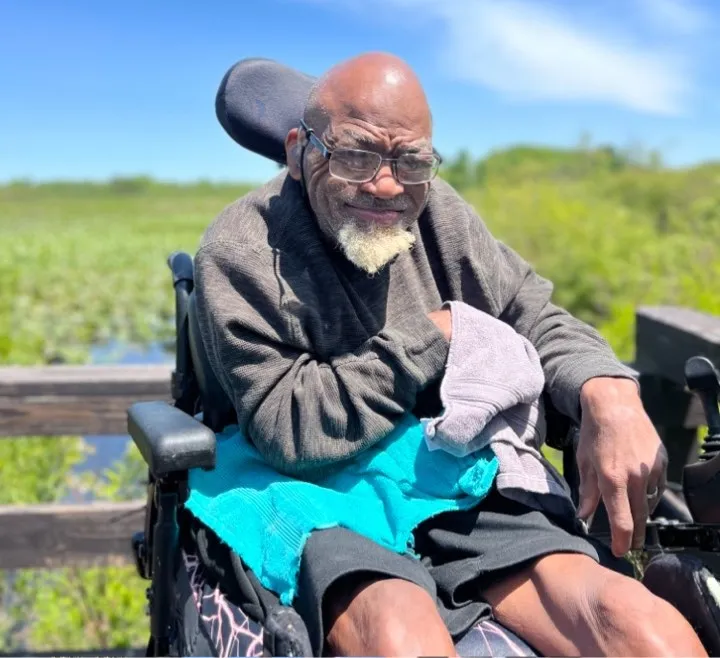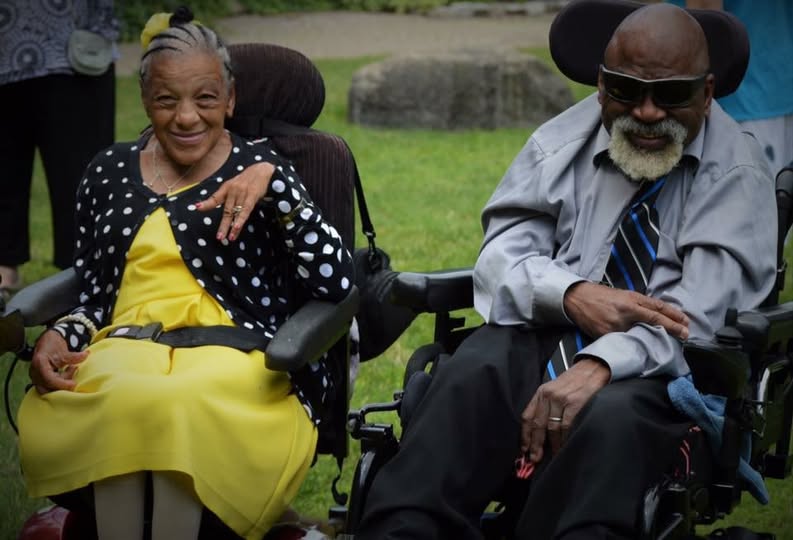
You could hear Henry Wesley before you saw him: Zipping down the hall in his wheelchair, a mischievous grin already forming, ready to spread laughter and light wherever he went. If he liked you (and he probably did), he’d pause just long enough to tease you, unleash a deep laugh that often turned into a coughing fit, then speed off to the next office to do it all over again.
He was a friend, a husband, a survivor of Willowbrook, and a passionate self-advocate. A familiar face in the art room at Aspire of WNY’s Mall Blvd. Day Hab—not because of a deep passion for painting, but simply because he loved people. He showed up every day to be with staff, listen to music, share jokes, and make everyone feel like they belonged.
Henry endured unimaginable hardship, abandonment, neglect, and the trauma of Willowbrook—but he never wore that pain on his sleeve. Instead, he carried a radiant light. He wheeled through the halls with pride, cracking jokes, greeting everyone, and making it impossible not to smile when he was around.
Many staff first met Henry during new employee orientation, where he introduced himself using his communication device. He would share his story with strength—his past, his battles, and what he stood for now: dignity, inclusion, and the right to be heard.
“I met Henry on my first day at the agency,” recalls Terry Lair, Art Facilitator. “He shared his story through his Dynavox. He talked about Willowbrook and about being left behind. It was heartbreaking. But even then, he put us at ease with his calm strength.”

For years, Henry lacked a voice—but once he found it, he used it to the fullest. He spoke at conferences, participated in Developmental Disabilities Day, and made sure everyone knew that he was a registered voter. His determination carried into his personal life, too. When Henry and his beloved late wife, Jean, decided to get married, they had to fight for that right. “She was the boss,” people joked, “But he didn’t mind, he absolutely adored her.” They were inseparable, well-known, well-loved, and deeply devoted to each other.
Outside of advocacy, Henry was a part-time jokester, and a full-time social butterfly. He could always be found floating from room to room at the Mall Blvd. Day Hab site, teasing staff and sharing belly laughs. One day, just for fun, he showed up to the Day Hab wearing a single gold hoop earring just to get a reaction.

Terry remembers a time when he used two paintbrushes at once in the art room. One slipped from his grip, flipped through the air, and landed in his hair with a large streak. Henry howled with laughter, and so did everyone else.
Or, the time he demanded he give a staff member a lift on the back of his power wheelchair—landing her in a bit of trouble, which he found hilarious. There are countless silly stories of Henry. But there were also quiet moments and peaceful, gentle times where he simply sat, content.
When Henry transitioned out of the Day Hab program to spend more time in the community, things grew quieter. Now that he’s gone, the quiet feels heavier. But the joy he left behind still echoes.

Soon, Henry’s photo will hang on a memorial wall at the agency’s Mall Blvd. site.
But he also lives on in us—in the way we do our work, in how we treat the people we support, and in how we listen more closely to those who communicate in ways we’re still learning to understand.
“If you told me when I met him that I’d have full conversations with someone nonverbal,” Terry said, “I wouldn’t have believed it. But Henry didn’t need words. He said more than most people ever do.”
“If I could say one more thing to him,” she added, “it would be thank you—for teaching me, for trusting me, for showing me how much life can be lived, even when it starts hard.”
And what would we say to him now? That we miss him, that we’re better for having known him, and that he taught us to listen, to laugh, and to advocate both fiercely and kindly. Rest easy Henry, and keep laughing.

